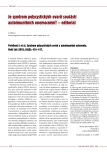Familial hypercalcemia and hypophosphatemia: importance in differential diagnosis of disorders in calcium‑ phosphate metabolism
Authors:
I. Žofková
Authors‘ workplace:
Endokrinologický ústav Praha, ředitel doc. MU Dr. Vojtěch Hainer, CSc.
Published in:
Vnitř Lék 2010; 56(5): 397-401
Category:
Reviews
Overview
Hypercalcemia and hypophosphatemia are symptoms of two relatively rare hereditary diseases and are extraordinarily important from the standpoint of the differential diagnosis. Mutation in calcium sensing receptor gene (CaSR) clinically manifests as familial hypocalciuric hypercalcemia (FHH) or as the much more serious neonatal hyperparathyreosis. Hypercalciuric hypocalcemia is extremely rare. Prognosis for the most frequent mutations in the CaSR gene FHH is considered benign; nevertheless, if overlooked it can lead to an incorrect diagnosis of primary hyperparathyreosis, which has a fundamentally different prognosis and treatment. Familial hypophosphatemia sometimes occurs as hereditary rickets, which is a consequence of insufficient production of vitamin D ‑ hormone or abnormal function of vitamin D receptors (VDR). The disease manifests as X‑linked dominant hypophosphatemic rickets or autosomal dominant hypophosphatemic rickets. Autosomal recessive form is very rare. Oncogenic hypophosphatemia should be excluded in differential diagnosis. In this review the issues of pathogenesis, differential diagnosis and treatment of FHH and hypophosphatemic rickets are discussed.
Key words:
hypocalciuric hypercalcemia – primary hyperparathyreosis – hypophosphatemia – hereditary rickets
Labels
Diabetology Endocrinology Internal medicineArticle was published in
Internal Medicine

2010 Issue 5
-
All articles in this issue
- Evaluation of cardiovascular high risk population in Specialists Ambulance: ESA
- The prevalence of anemia and its impact on hospitalization mortality in patients with acute heart failure
- The progress of autonomic parameters in patients after myocardial infarction with ST elevation
- Familial hypercalcemia and hypophosphatemia: importance in differential diagnosis of disorders in calcium‑ phosphate metabolism
- A review of the effects of prolactin hormone and cytokine on the development and pathogenesis of autoimmune diseases
- Polycystic ovary syndrome and autoimmune diseases
- The heart of a patient with type 1 diabetes
- Gender differences in non‑pharmacological treatment of chronic heart failure
- ILCOR recommendation on signing of automated external defibrillators (AEDs)
- Internal Medicine
- Journal archive
- Current issue
- Online only
- About the journal
Most read in this issue
- Familial hypercalcemia and hypophosphatemia: importance in differential diagnosis of disorders in calcium‑ phosphate metabolism
- A review of the effects of prolactin hormone and cytokine on the development and pathogenesis of autoimmune diseases
- Polycystic ovary syndrome and autoimmune diseases
- ILCOR recommendation on signing of automated external defibrillators (AEDs)
